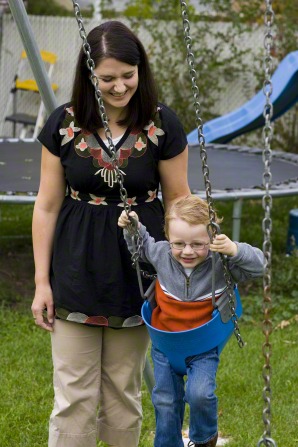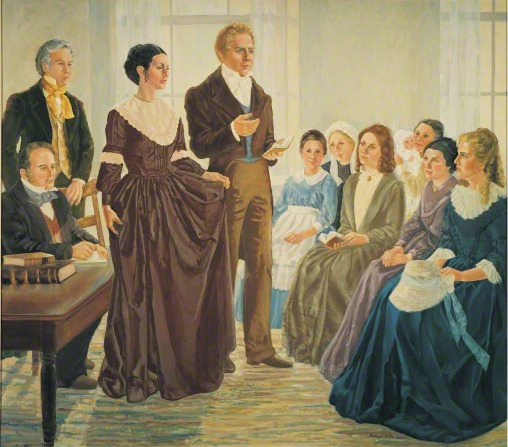I went through a few different titles for this post, thinking about what I was going to write: Women and the Priesthood, Women and Equality, Culture vs Doctrine, Feminist or Disciple of Christ? I hope this title describes the post accurately.
My mind has been really full lately. This post, I think, is really just me trying to sort out all those thoughts.
I am not sure what piqued my interest in the Mormon feminist movement, but I am pretty sure it had something to do with all the talk about Joanna Brooks’ book and Ralph Hancock’s responses and critiques of the book. It may have been a post I read on Segullah about the “war on womanhood”. Regardless, a few months ago I started doing a lot of thinking about equality, gender, and the doctrine of the gospel of Jesus Christ. I also started thinking about the way women (and men) in the Church seem to misunderstand the fundamental doctrines of Jesus Christ.
Manhood/Womanhood vs Discipleship
A commenter on the Segullah post said, “I don’t think in terms of womanhood and manhood. We are all children of God with eternal potential. There is nothing uniquely female about the godly characteristics I am asked to develop.” I agree with this in a major way. In the Church’s handbook for parents there is a section that talks about teaching children to accept and understand their gender roles. If you are unfamiliar with the A Parent’s Guide, I will point out that it was published in 1985 and has not been revised since. When I read this section yesterday I was fully expecting to read about how the Church encourages stereotypical gender roles, such as cooking and  cleaning for women, and college and job skills for men. I was pleasantly surprised to find that the Church has been teaching equality of the genders at least since the mid-80s, but obviously the doctrine of Jesus Christ has been around for longer than that, and as “all are alike unto God” (2 Nephi 26:33), this doctrine of equality has been part of the gospel since before any women’s movements.
cleaning for women, and college and job skills for men. I was pleasantly surprised to find that the Church has been teaching equality of the genders at least since the mid-80s, but obviously the doctrine of Jesus Christ has been around for longer than that, and as “all are alike unto God” (2 Nephi 26:33), this doctrine of equality has been part of the gospel since before any women’s movements.
A quote from the book that supports the commenter at Segullah says, “There are many patterns of behavior that are appropriate for all people. Everyone, male and female, is invited to examine the character of Jesus Christ and emulate him … Among the traits Christ revealed as proper for men and women alike are faith, hope, charity, virtue, knowledge, temperance, patience, kindness, godliness, humility, diligence, and love. These virtues transcend gender. They are Christlike attributes to which both sexes should aspire … Spiritual gifts, as described in Doctrine and Covenants 46, are not restricted to one gender either. Included are gifts of knowledge, belief, administration, organization, healing, and discernment.” There is more of the same through the section, including statements such as, “You should provide opportunities for your children to develop talents in various directions unhindered by improper stereotypes … Teach your daughters and your sons to seek opportunities to learn and to exploit every such opportunity fully … Boys must learn basic domestic skills, and girls must be able to earn a living if necessary.”
Gender as an Eternal Characteristic
However, the same guide says, “members of the Church must not be deceived about one immutable truth: there is eternal significance in being a man or a woman.” And recall that in The Family: A Proclamation to the World it states,  “Gender is an essential characteristic of individual premortal, mortal, and eternal identity and purpose.” So, if gender is so important, but each gender is equally expected (by Jesus Christ and Heavenly Father) to develop all of the characteristics of Christ (many of which, ironically, are “naturally” attribute to women) and any of the spiritual gifts available to God’s children, then what is the difference between the genders?
“Gender is an essential characteristic of individual premortal, mortal, and eternal identity and purpose.” So, if gender is so important, but each gender is equally expected (by Jesus Christ and Heavenly Father) to develop all of the characteristics of Christ (many of which, ironically, are “naturally” attribute to women) and any of the spiritual gifts available to God’s children, then what is the difference between the genders?
The same commenter at Segullah pointed out this problem we often encounter in trying to learn and teach about the significance of gender, “Our efforts to teach women of their spiritual equality often overreach into expressions of otherness, specialness, or even betterness [than men]. If we truly believed we were equal in God’s eyes we wouldn’t need to find ways to feel set apart or special.”
So, how do you teach the importance of gender and identity while staying away from expressions of “otherness” and “betterness”?
When Equality Gets in the Way
Equality is a hard principle. What does it really mean? Does equality mean that we should all be the same? Does it mean that everyone should have the exact some opportunities in this life? Does it mean that we should all be treated the exact same? Children should be treated like adults, young adults should be treated like mature adults, the elderly should be treated like young adults?
What does equality really mean? What do we really want when we say we want “equality for women”?
Men today are pressured to be worldly. They are pressured to neglect their families for their jobs, often using their families as an excuse for how much they work. They are pressured to provide the luxuries of the world for their families.
Families are used by the world as an excuse for men to focus on their jobs and careers, rather than focus on their family. It seems like the opinion of women is, “Why do we only pressure men to be worldly? I want pressure to be worldly, too!” That’s not what they say, but think about it – as women we are not fighting for men to come home, man up, and protect and lead their families. Instead we are fighting for women to be pressured to do more outside the home. We want equality, but we want it in the wrong direction. We are sick of the stereotype of women being housewives and staying at home and doing the laundry while our husbands are out smoking cigars and going to bars with their coworkers and bosses. Should we instead be sick of the stereotype of men being workaholics, spending more time pursuing their careers than spending time with their families?
Is our fight for equality perhaps pushing all of us in the wrong direction?
Manhood/Womanhood and Discipleship
Although there are cultural stereotypes for gender roles which, as members of Christ’s Church we should not espouse, gender is still a significant part of our creation.
In the world today I think that some would like to remove all distinction between the genders. In fact, we are moving at an alarming rate toward a society where you can choose your gender. You can choose to marry someone of the same gender, as if there isn’t a reason why we were created male and female. It was just chance, or it was a mistake nature or God made. If you don’t like it, don’t be that gender, don’t follow the “gender roles” of that gender (and I don’t mean the stereotypical ones here, I mean the we-need-a-man’s-reproductive-organs-and-a-woman’s-reproductive-organs-to-make-babies roles).
Why would we be created the way we are if there wasn’t a reason for it? There is a reason for it. Gender is essential to our identity as children of God. I am just still learning exactly what that means.
From the proclamation again, “By divine design, fathers are to preside over their families in love and righteousness and are responsible to  provide the necessities of life and protection for their families. Mothers are primarily responsible for the nurture of their children.”
provide the necessities of life and protection for their families. Mothers are primarily responsible for the nurture of their children.”
What does this really mean, though? I do not think it means what a lot of people think it means. I do not think it means that men or women are necessarily more naturally inclined to perform their divinely appointed roles. I take this as more of a commandment. Rather than God saying, “Women, you are more naturally predisposed to nurturing, so you guys nurture. Men, you are more predisposed to protecting your families and earning a living, so you guys do that.” I think what God is saying is more like, “ Regardless of what your ‘natural’ tendencies are, I want you, women, to nurture children. Men, I want you to provide a safe environment for women to do that, and make sure women and children are clothed and fed and sheltered, and help her out in the nurturing.”
Regardless of what your ‘natural’ tendencies are, I want you, women, to nurture children. Men, I want you to provide a safe environment for women to do that, and make sure women and children are clothed and fed and sheltered, and help her out in the nurturing.”
My husband and I have talked at length about this. As far as providing for a family goes, I could make probably two or three times my husband’s income. But my husband has been commanded to provide for his family, and we feel that it is really important for him to do that. Staying home with kids and being nurturing is hard for me, even though I know a lot about raising kids (from a research stand point – not from experience). I can deal with workplace stress a lot easier than I can deal with children-induced stress. But we feel that it is really important that I learn how to nurture our children, even though I would rather provide for our family than nurture our family, and my husband would rather have it be that way, too.
I am aware that there are individual circumstances, but as with every other area in the gospel where there is an “ideal” we should not be looking for reasons to not live the ideal. Nor should we judge others who are not living the ideal for whatever reason.
Questions Without Answers
I’ve been asking a lot of questions in the past few months, and I don’t have all the answers yet – and I was hoping that I would have more answers as I wrote this post, but they seem to elude me. Please feel free to share your thoughts and feelings, and especially quotes from talks or scripture passages that help you answer these questions. Maybe I can find some more answers, too.








 “organiz[ed] the women under the priesthood after the pattern of the priesthood.” The Relief Society, then, is a priesthood quorum for women. Sister Beck quoted a talk given by President Boyd K. Packer about quorums, stating that the words “quorum vos unum” mean “of whom we will that you be one”. She then said, “The word society has a meaning nearly identical to that of quorum. It connotes “an enduring and cooperating … group” distinguished by its commons aims and beliefs.”
“organiz[ed] the women under the priesthood after the pattern of the priesthood.” The Relief Society, then, is a priesthood quorum for women. Sister Beck quoted a talk given by President Boyd K. Packer about quorums, stating that the words “quorum vos unum” mean “of whom we will that you be one”. She then said, “The word society has a meaning nearly identical to that of quorum. It connotes “an enduring and cooperating … group” distinguished by its commons aims and beliefs.” provide the necessities of life and protection for [the Church]. [The sisters of the Church] are primarily responsible for the nurture of [the members of the Church]. In these sacred responsibilities, [brethren and sisters] are obligated to help one another as equal partners.” (
provide the necessities of life and protection for [the Church]. [The sisters of the Church] are primarily responsible for the nurture of [the members of the Church]. In these sacred responsibilities, [brethren and sisters] are obligated to help one another as equal partners.” (




 provide the necessities of life and protection for their families. Mothers are primarily responsible for the nurture of their children.”
provide the necessities of life and protection for their families. Mothers are primarily responsible for the nurture of their children.”  Regardless of what your ‘natural’ tendencies are, I want you, women, to nurture children. Men, I want you to provide a safe environment for women to do that, and make sure women and children are clothed and fed and sheltered, and help her out in the nurturing.”
Regardless of what your ‘natural’ tendencies are, I want you, women, to nurture children. Men, I want you to provide a safe environment for women to do that, and make sure women and children are clothed and fed and sheltered, and help her out in the nurturing.”






